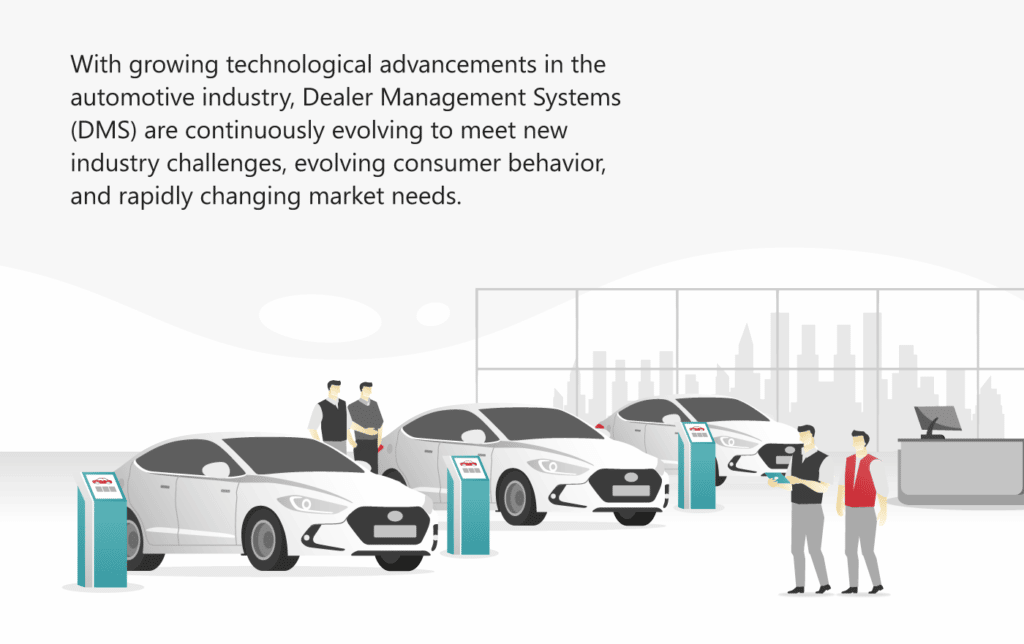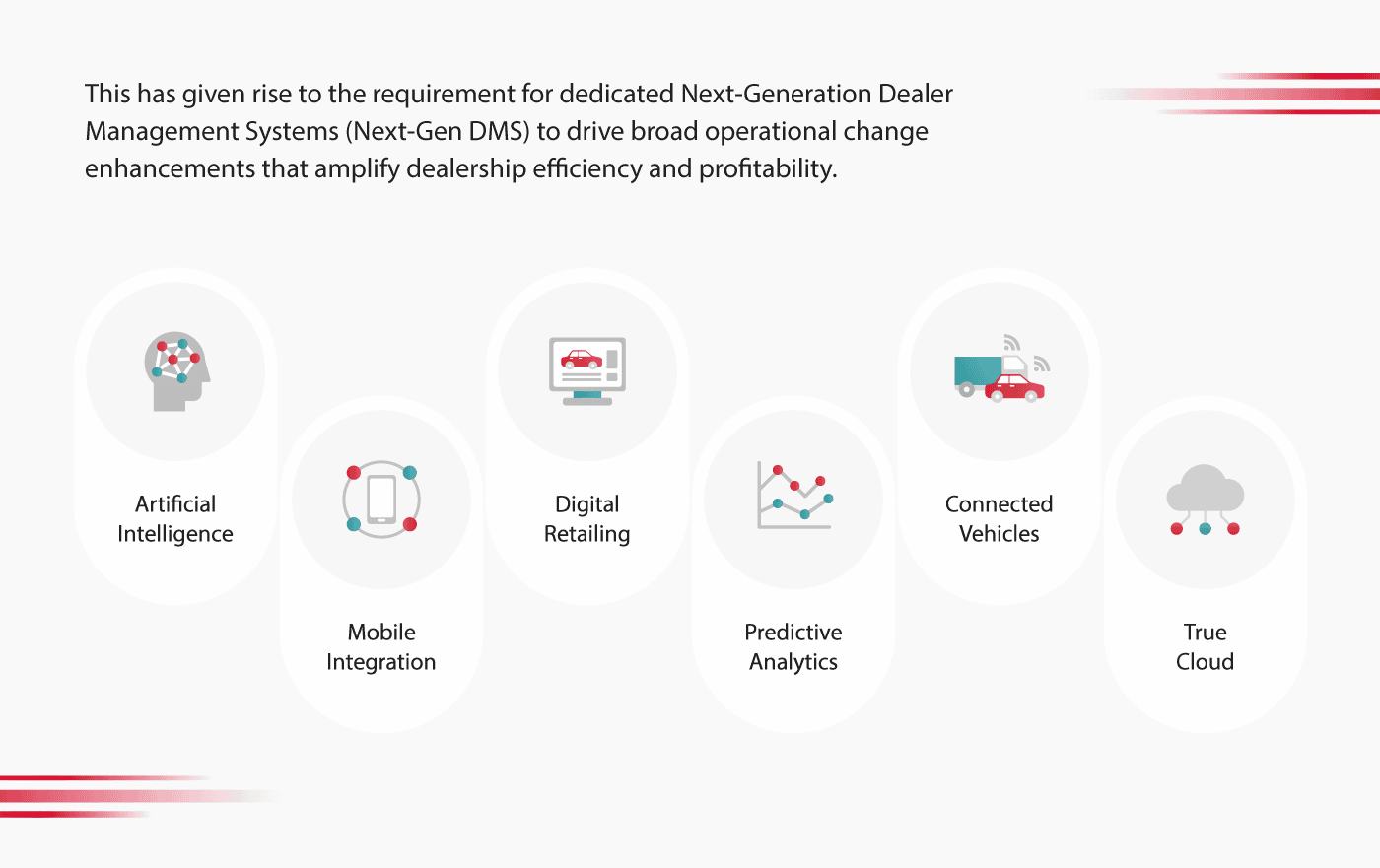A Dealer Management System (DMS) is often seen as the control center for the dealership. Dealer management systems address an array of requirements that encompass pivotal areas such as pre-sales (lead and inquiry management), sales, purchasing, after-sales and service, inventory management, financial accounting and reporting, Human Resources (HR), and Customer Relationship Management (CRM).
Dealer management systems also connect dealers to Original Equipment Manufacturers (OEMs), distributors, and customers, providing a flawless and enriched operational experience.
In essence, a dealer management system is the Enterprise Resource Planning (ERP) solution of a dealership as it enables dealers to effectively oversee and manage the day-to-day operations of the entire dealership in real-time, providing them with an enriched, flawless, and seamless operational experience.
While most automotive dealerships have already implemented a dealer management system into their operations, dealerships are continuously updating their system to keep abreast with technological advancements and ensure they automate and digitize all levels of the dealership for continuous process development.
Dealer management systems have also become an integral component of the dealership’s supply chain network and are known to be one of the top strategic technology dealership investments.
According to Precisions Reports, the global automotive dealer management system market is expected to flourish at a significant CAGR of 8.37 during 2021-2027, reaching USD 6010.0 million. This may be attributed to the increasing software and services demands, the growing number of automotive dealers, franchises, and retailers, and a surge in automotive sales.
The Next generation of Dealer Management Systems


Artificial Intelligence
The artificial intelligence (AI) tools that come embedded in new DMS have become a need for most dealerships. AI is simplifying the management of documents and processes.
Coupled with machine learning, dealerships will be able to automate the day-to-day activities of the dealership. This eliminates the need for professionals to spend time on redundant paperwork and allow them to focus on matters that are more pressing. The data captured through AI can also help dealerships make more informed decisions that could yield greater benefits for the business.
Mobile integration
Older dealer management systems lack accessibility via mobile. This creates a challenge for the field force and decision-makers as it restricts the operational capabilities of dealerships. Mobile creates increasing accessibility and DMS will evolve into a mobile-friendly solution that will bring about immense benefits for business communication. The web-based applications will provide system access on the go.
With data readily accessible in real-time, documents can be accessed, approvals can be granted, and business decisions can be swiftly made. This speeds up the process and helps close sales deals without the need for long waiting periods.
Digital retailing
The vehicle purchasing journey for customers is evolving- more and more customers are spending a significant amount of their purchasing journey online. While the physical showroom continues to exist, its format will be tweaked. Newer retail models are being explored in an attempt to strike a hybrid balance.
A next-gen DMS will enable automotive dealerships to overhaul the retail experience. The seamless transitions between the digital and dealership experience for the customers that the DMS offers will allow consumers to interact with dealerships through a frictionless and seamless approach.
Predictive analytics
Customer experience is of utmost importance for any automotive dealership. 48% of respondents in a survey by McKinsey & Company said that they view customer experience as “influential” in their purchasing decision while 22% said it is “very influential.”
With predictive analytics, dealer management systems can help dealerships elevate the customer experience during the point of sale as well as throughout the entire ownership lifecycle, offering customer experiences that are personalized to the needs of each customer.
Predictive analytics can anticipate a customer’s service vehicle maintenance needs when coupled with Big Data. Dealerships can use insights such as past vehicle purchases, consumer behaviors, and demographics to create personalized and targeted marketing content. The dealership can also use the DMS to send out service reminders, explain repair work, and simplify payments.
Connected vehicles
With vehicles becoming increasingly connected through the Internet of Things (IoT), machine learning, and sensors, real-time vehicle data is easily obtained. Dealer management systems are quickly becoming smarter.
Dealerships are turning to DMS to capture data such as details of the vehicle including mileage clocked, vehicle performance and conditions, as well as driver-vehicle behaviors which can be used by manufacturers to spot trends and make vehicle model improvements, through these new technologies.
With a DMS, dealerships can better anticipate maintenance and repairs for better service bay management, ensure adequate stock of parts and manage recalls. It can also help to monitor supply chain issues to ensure quality materials and reliable components of parts, resulting in more efficient time management and cost control.
True Cloud
While most dealerships have a dealer management system implemented, many of them are still using on-premises solutions that require extensive server maintenance, heavy costs, and high energy consumption.
The web-based architecture of on-cloud DMS makes it easier to scale. The elastic scalability that it offers allows for new features and resources to be added to keep up with new industry trends. In the future, dealerships will quickly turn to on-cloud DMS due to its ability to combat security threats and conduct periodic security audits.
Brimborg and the Need for Evolving Dealer Management Systems
Following is a recent customer story that underpins the need for Next-Gen DMS.
Brimborg, Iceland’s largest integrated vehicle and equipment distributor, wanted to set a new standard for quality and service in their business of importing, distributing, selling, and servicing cars, commercial vehicles, construction equipment, and power engines. Their strategy: enable staff with the best possible tools to continuously provide customers with superior value.
The challenge:
Brimborg had been running their business on a system since 1986 and found that it was limiting their ability to grow and be nimble. Their existing system was divided into three parts: One for service workshops, one for part sales, and one for vehicle and heavy machinery sales along with the finance module. The company also ran three customer systems with different discounts and credit limits in each, sending out multiple statements to customers each month.
The solution:
Annata and Dynamics enabled Brimborg to streamline operations, bringing everything together under one solution. As such, they achieved greater visibility into sales and service history for customers and equipment and inventory and pricing for all brands.
Annata also helped empower Brimborg by automating its business processes, freeing up staff to focus on priorities rather than repetitive administrative tasks. Brimborg can now handle emergency orders quickly and efficiently, boosting customer satisfaction.
This brought positive results to Brimborg’s bottom line and gave the company a true competitive advantage.

Accelerate the performance of your automotive dealership today. Contact us about your DMS needs or learn about the Annata 365 Dealer Management Solution here.













